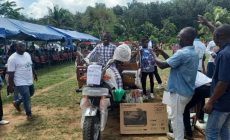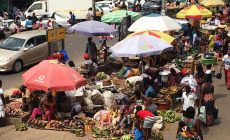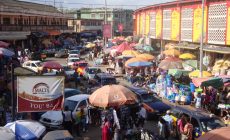STMA to convert plastic waste into blocks for construction
- Posted on
- Comment

The Sekondi-Takoradi Metropolitan Assembly (STMA) has started work to convert recycled plastic waste into blocks for the construction of household toilets.
The project would serve as a model for the use of plastic waste as material for construction to create jobs for the youth.
It fell under the Entrepreneurship Training and Climate-smart production technology of the STMA and its sister city, Palermo Municipality, Italy.
Mr Isaac Aidoo, the Coordinator of the three-year European Union-funded Twin-Cities in Sustainable Partnership Project (TCSPP), said: “We have a lot of plastic waste in Sekond-Takoradi. We can use it for blocks, make pavement blocks, and for household construction.”
“We are getting somebody in Accra, who has used plastic waste to build his own house. We want to encourage the youth to go into that venture.”
At a meeting to update the media on the progress of the TCSPP in Takoradi, Mr Aidoo said the project would build 500 bio-digester toilets for poor households, especially along the coast, where open defecation was a challenge.
It is expected to train 150 youth, he said, and encouraged the youth in the area to pick-up forms to enroll.
There would be the construction of 100 eco-friendly ovens to support fishmongers along the coast, as part of the climate resilience plan, and representatives would learn the new craft, he said, as the old ovens emitted lots of smoke.
Under the culturally sensitive and inclusive urban strategies, 50 vulnerable individuals, 50 small holder vegetable farmers, and 100 unemployed youth had been trained in urban farming.
Institutions, landlords and resident associations have planted about 5,000 fruit trees to enhance food security at the community level, Mr Aidoo said.
The construction of demonstration farms equipped with greenhouse irrigation facilities to promote urban agriculture had also been done.
Mr Aidoo noted that the TCSSP would roll out a behavioural change campaign around coastal areas to improve sanitation and the general well-being of the people.
The project also seeks to intensify communications on Water, Sanitation and Hygiene (WASH), COVID-19 and other infectious diseases.
This year, it would engage the youth on; Adolescent Reproductive Health, Gender Based Violence, inclusive education and irregular migration.
Two new reproductive health kiosks would be constructed for effective youth engagement on their reproductive rights issues and assistance, Mr Aidoo said.
The Social Welfare and Community Development as well as the Domestic Violence and Victims Support Unit of the Ghana Police Service would receive some technical assistance to help in the collection of data to aid in development planning.
Mr Abdul-Mumin Issah, the Metropolitan Chief Executive, said the three-year project would address the United Nations Sustainable Development Goals 11 and 17, focusing on sustainable cities, communities, and partnership for development.
Its overall objective was to promote a sustainable and integrated urban development in Sekondi-Takoradi and Palermo and improve upon urban management, he said.
Mr Issah said the Assembly had received a three-million Euros grant to support the estimated finance gap of GHc2,408,330,585 to implement the four-year Medium Term Development Plan for the Sekondi- Takoradi Metropolis.
He noted that the project had contributed significantly to achieving some of the Assembly’s plans and promoted accountability, open administration and popular participation by the people.
He urged the media to propagate the success story of TCSPP through their various platforms.
Mr John Buckman, the Presiding Member of the Assembly, said the design of an E-gov platform by the project would deepen citizen participation in local governance and encouraged the media to create the needed awareness.
-GNA










 (Selorm) |
(Selorm) |  (Nana Kwesi)
(Nana Kwesi)